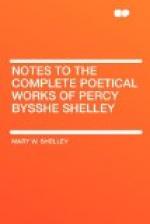The loss of his early papers prevents my being able to give any of the poetry of his boyhood. Of the few I give as “Early Poems”, the greater part were published with “Alastor”; some of them were written previously, some at the same period. The poem beginning ’Oh, there are spirits in the air’ was addressed in idea to Coleridge, whom he never knew; and at whose character he could only guess imperfectly, through his writings, and accounts he heard of him from some who knew him well. He regarded his change of opinions as rather an act of will than conviction, and believed that in his inner heart he would be haunted by what Shelley considered the better and holier aspirations of his youth. The summer evening that suggested to him the poem written in the churchyard of Lechlade occurred during his voyage up the Thames in 1815. He had been advised by a physician to live as much as possible in the open air; and a fortnight of a bright warm July was spent in tracing the Thames to its source. He never spent a season more tranquilly than the summer of 1815. He had just recovered from a severe pulmonary attack; the weather was warm and pleasant. He lived near Windsor Forest; and his life was spent under its shades or on the water, meditating subjects for verse. Hitherto, he had chiefly aimed at extending his political doctrines, and attempted so to do by appeals in prose essays to the people, exhorting them to claim their rights; but he had now begun to feel that the time for action was not ripe in England, and that the pen was the only instrument wherewith to prepare the way for better things.
In the scanty journals kept during those years I find a record of the books that Shelley read during several years. During the years of 1814 and 1815 the list is extensive. It includes, in Greek, Homer, Hesiod, Theocritus, the histories of Thucydides and Herodotus, and Diogenes Laertius. In Latin, Petronius, Suetonius, some of the works of Cicero, a large proportion of those of Seneca and Livy. In English, Milton’s poems, Wordsworth’s “Excursion”, Southey’s “Madoc” and “Thalaba”, Locke “On the Human Understanding”, Bacon’s “Novum Organum”. In Italian, Ariosto, Tasso, and Alfieri. In French, the “Reveries d’un Solitaire” of Rousseau. To these may be added several modern books of travel. He read few novels.
Note on poems of 1816, by Mrs. Shelley.
Shelley wrote little during this year. The poem entitled “The Sunset” was written in the spring of the year, while still residing at Bishopsgate. He spent the summer on the shores of the Lake of Geneva. The “Hymn to Intellectual Beauty” was conceived during his voyage round the lake with Lord Byron. He occupied himself during this voyage by reading the “Nouvelle Heloise” for the first time. The reading it on the very spot where the scenes are laid added to the interest; and he was at once surprised and charmed by the passionate eloquence and earnest enthralling interest that pervade this work. There was something in the character of Saint-Preux, in his abnegation of self, and in the worship he paid to Love, that coincided with Shelley’s own disposition; and, though differing in many of the views and shocked by others, yet the effect of the whole was fascinating and delightful.




